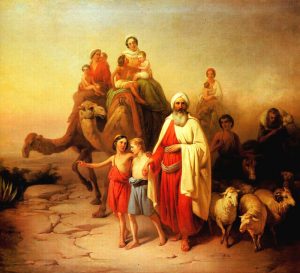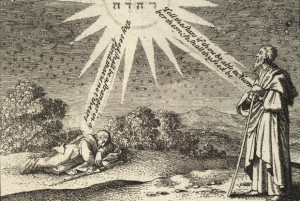Thoughts on Sunday’s Lessons for Feb. 25, 2024 (Lent 2B)

Abraham’s Journey from Ur to Canaan. Oil on canvas (1850), by József Molnár (1821-1899). Hungarian National Gallery. (Click image to enlarge.)
First Reading: Genesis 17:1-7, 15-16
Our first reading this week turns to another of the key Hebrew Bible covenants between God and God’s chosen people. This time God calls Abram and Sarai and tells them to go to a new land at their great age; Abram is 99 and they have had no children yet. They will be given new names – Abraham and Sarah – and in turn for accepting this call, God promises that they and their offspring will yield a great multitude of nations, and that God will be with their offspring forever. In contrast with God’s unconditional covenant with Noah that we heard last week, this covenant is reciprocal: In order for their offspring to gain the Promised Land (a promise made in the verses that our Sunday reading skips over), they and their descendants must “walk before God and be blameless.”
Psalm: Psalm 22:22-30
The theme of God’s covenant with Abraham and Sarah, through their grandson Jacob, the son of their son Isaac, echoes in Sunday’s Psalm portion. The Psalmist exults in the eternal nature of that covenant with Jacob (whom God later renamed Israel), and calls on all of Israel’s offspring to serve God, because as a result of Abraham’s covenant they will be known as God’s own forever. Even now the priest echoes similar words in every baptism, while those being welcomed into the household of God are anointed with blessed oil.
Second Reading: Romans 4:13-25
Paul, too, evokes the eternal nature of God’s promise to Abraham’s descendants in this passage from Romans. He adds something new, too: He reaches out to include Gentile Christians within God’s promise. While Abraham’s descendants received God’s covenant through the law, Gentiles who become Christians now receive it through their new faith, Paul writes. Seeking to reconcile a faith community in Rome that included both Jewish and Gentile Christians, Paul assures them that they all are now children of Abraham and Sarah, through faith in Jesus’s death and resurrection.
Gospel: Mark 8:31-38
In the verses just before this, when Jesus had asked his disciples who they think Jesus is, some guessed that he was John the Baptist. Some guessed Elijah, and others imagined him as one of the prophets. Peter, though, boldly declared, “You are the Messiah!” Surely, based on Torah’s tradition, they assumed that the Messiah would come to wage war, defeat their hated Roman overlords, and win Israel’s freedom. Jesus, though, warns that his way is not like that. He tells them that he will face rejection, punishment and death before rising again after three days. This is not at all what Peter wants to hear, but his protests earn him a startling response from Jesus: “Get behind me, Satan!” If you want to follow Jesus, he tells them, you must deny yourself. Take up your cross. Prepare to give your life in order to save it.



